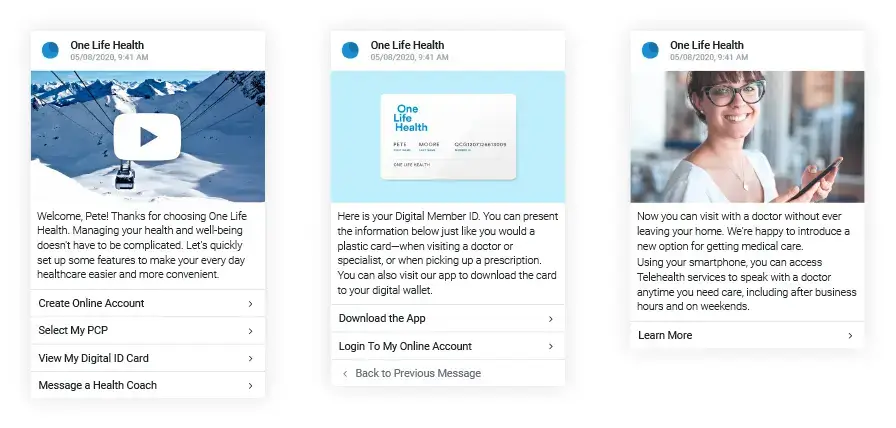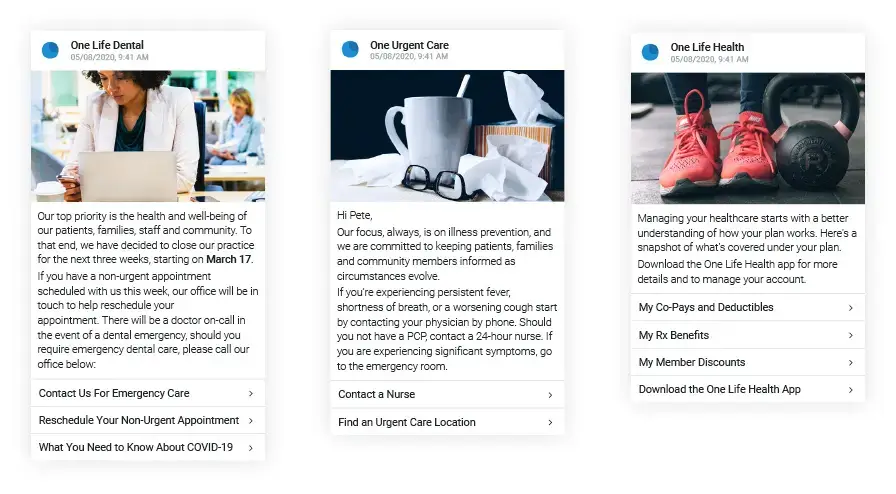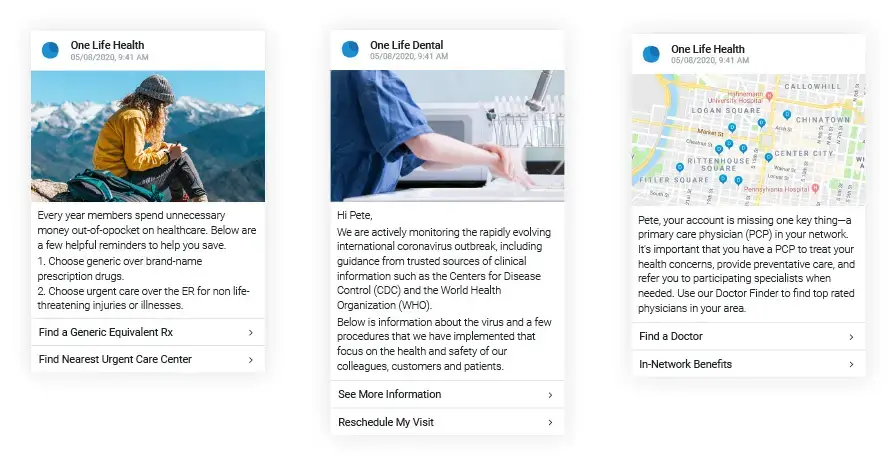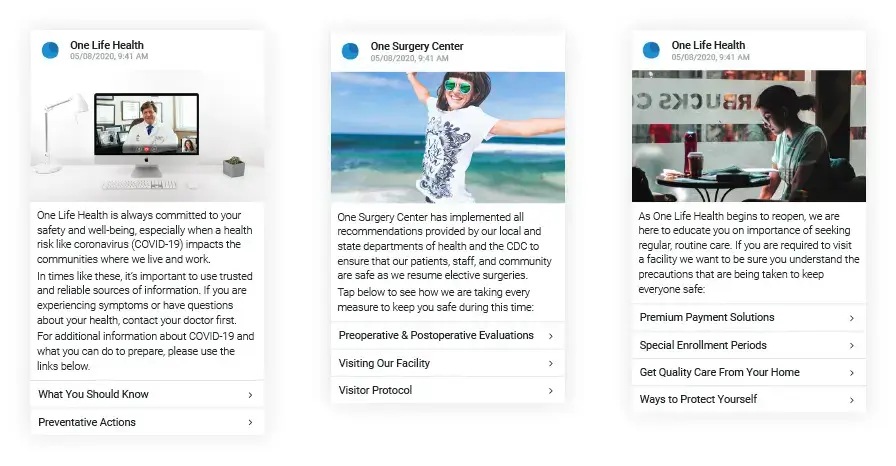
Blog
Healthcare Communication Can (And Should) Anticipate Member Needs
Healthcare communication platforms and tools have been gaining traction for years – promising lower operational costs, more efficient member and patient interactions, expanded access to healthcare specialists, and increased patient engagement and satisfaction.
However, according to a recent J.D. Power study, many healthcare companies severely missed the mark when it came to communicating in the early stages of the Covid-19 pandemic. A staggering 60% of private plan members say they were never contacted by their insurer with information related to the virus, and 48% said they feel their insurer has not shown concern for their health since the crisis began.
This disconnect between healthcare company communications and patient or member expectations isn’t unsolvable. The key to closing that gap is timely, relevant communications that mirror the personalization levels achieved by the likes of Netflix or Amazon. Relay’s HIPAA-compliant platform has been helping organizations improve engagement in this way for over a decade, and since March, leading healthcare companies have sent more than 3 million covid-related messages to members and patients using Relay’s proactive mobile engagement platform.
Below, we outline five critical moments where leading healthcare companies are using Relay to drive meaningful engagement, digital adoption, and satisfaction – all while containing operational costs.
Drive Adoption, Onboarding to Telehealth Solutions
Driving adoption of telehealth and telemedicine services has become a top priority for healthcare companies to prevent the spread of the virus if patients or members don’t require hospitalization, and to keep costly ER visits to a minimum. Unfortunately, many people are either unsure if their insurance company covers telehealth or they are unfamiliar with how to set it up. In fact, just 9% of plan members said they have used these services, while 48% said they would consider doing so if it was covered by their health plan. At a time when staying home is saving lives, healthcare companies have an obligation to make it easy for members and patients to receive care virtually.
Relay’s secure mobile channel has been leveraged heavily to introduce and onboard first-time users to telemedicine services since March, leading to a 45% increase in utilization, while providing personalized attention that makes patients feel safe and supported. Another recent study revealed that the likelihood of people returning to telemed for healthcare once they’ve tried it is close to 75%, so driving adoption of digital services will continue to pay off even as the country reopens.

Proactive Support is the Most Effective Communication in Healthcare
In the last few months, businesses across every single industry have been reaching out to their customers to provide updates, but the importance of these messages ranges drastically. Email inboxes are cluttered with everything from online shopping deals to essential tax documents. In a health crisis, healthcare companies are finding it challenging to cut through the noise to deliver important, impactful notifications.
For content, healthcare teams can start by addressing the kinds of questions people are asking most during this time.
For example:
‣ What are the most up-to-date symptoms to look for?
‣ Where can I go to get tested?
‣ What is covered in my health plan?
‣ When will it be safe to return to the doctor?
Delivering timely and personalized answers proactively helps garner proper attention and engagement when it’s needed most.

Don’t Let Chronic Conditions Outside of COVID Lose Attention
Much of the focus today is on the COVID-19 outbreak, but millions of Americans are still dealing with chronic conditions that require regular attention and care. For nearly a decade, Relay has helped healthcare companies deliver highly targeted care and disease management experiences that provide support and education materials in manageable steps.
This guided approach helps patients and members digest the information more easily, empowering them to take control of their health and better manage their illnesses. In turn, our clients have seen as much as a 57% decrease in care gaps for patients with chronic conditions like diabetes.
Today, it’s equally as important to keep this vulnerable population engaged. With face-to-face interactions limited, healthcare companies can use personalized, digital experiences to provide at-home therapy instructions, tutorials and other online resources. Additionally, taking this approach to help facilitate home deliveries of medications will help to ensure adherence and keep at-risk patients and members on top of their health.

Mental and Behavioral Health Communication on the Rise
Research shows that many Americans are experiencing an increase in anxiety and stress, especially those dealing with financial hardships during this time. Mental and behavioral health resources are beneficial to the entire population right now, and healthcare companies can lean into personalized, one-to-one communications to help people feel extra supported and safe.
Many healthcare companies are changing policies and waiving costs for at-home mental health services, and they’re using Relay to introduce them to their patient populations. Additionally, periodic check-ins and general stress-relieving advice are other ways to engage patients and members. From quick tips for at-home exercises and fitness programs to nutrition information and healthy recipes, the healthcare community has a great opportunity to provide invaluable resources to consumers at this time.

Handle Call Deflection and Manage Operational Costs
Because of their one-to-one nature, phone calls are one of the most costly solutions to address consumer needs. Inbound calls have been overwhelming call centers for months, creating a spike in wait times and exacerbating customer frustrations and anxieties. Call center agents have been using Relay to send the crucial information members are looking directly to their mobile phones, leading to a 50% reduction in call handle times.
While these last few months have brought on plenty of challenges and problems, healthcare companies are finding new ways to deepen and strengthen relationships with patients and members. Leveraging proactive, personalized mobile engagement solutions like Relay helps healthcare companies provide much-needed attention and resources in the moment, improve outcomes, and contain operational costs.
As the country reopens, healthcare companies with an effective digital communications strategy in place will be able to educate and quickly connect customers with the information they need in real time, and pave the way for critical mobile engagement opportunities in the future.
To learn more about Relay’s HIPAA-compliant digital engagement solution for healthcare, request a personalized demo today.
